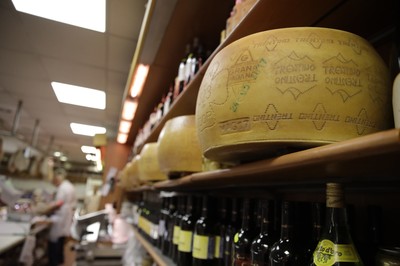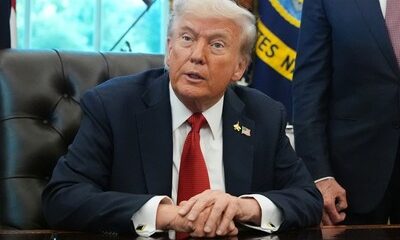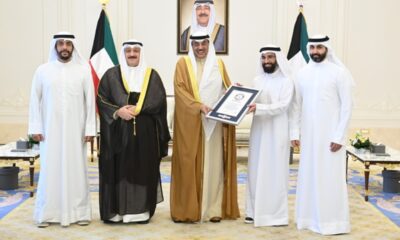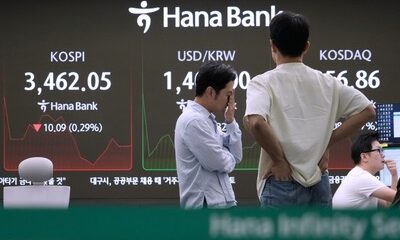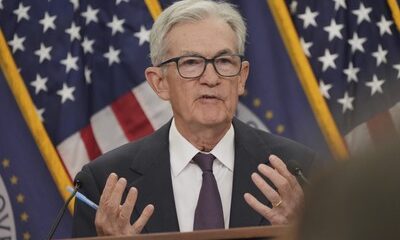FRANKFURT, Germany, July 6, (AP): The European Union expects to find out on Monday whether President Donald Trump will impose punishing tariffs on America’s largest trade partner in a move economists have warned would have repercussions for companies and consumers on both sides of the Atlantic.
Trump imposed a 20% import tax on all EU-made products in early April as part of a set of tariffs targeting countries with which the United States has a trade imbalance. Hours after the nation-specific duties took effect, he put them on hold until July 9 at a standard rate of 10% to quiet financial markets and allow time for negotiations.
Expressing displeasure the EU’s stance in trade talks, however, Trump said he would increase the tariff rate for European exports to 50%, which could make everything – from French cheese and Italian leather goods to German electronics and Spanish pharmaceuticals – much more expensive in the U.S.
The EU’s executive commission, which handles trade issues for the bloc’s 27-member nations, said its leaders hope to strike a deal with the Trump administration. Without one, the EU said it was prepared to retaliate with tariffs on hundreds of American products, ranging from beef and auto parts to beer and Boeing airplanes.
Here are important things to know about trade between the United States and the European Union.
The EU’s executive commission describes the trade between the U.S. and the EU as “the most important commercial relationship in the world.”
The value of EU-U.S. trade in goods and services amounted to 1.7 trillion euros ($2 trillion) in 2024, or an average of 4.6 billion euros a day, according to EU statistics agency Eurostat.
The biggest U.S. export to Europe is crude oil, followed by pharmaceuticals, aircraft, automobiles, and medical and diagnostic equipment.
Europe’s biggest exports to the U.S. are pharmaceuticals, cars, aircraft, chemicals, medical instruments, and wine and spirits.
Trump has complained about the EU’s 198 billion-euro trade surplus in goods, which shows Americans buy more stuff from European businesses than the other way around.
However, American companies fill some of the gap by outselling the EU when it comes to services such as cloud computing, travel bookings, and legal and financial services.
The U.S. services surplus took the nation’s trade deficit with the EU down to 50 billion euros ($59 billion), which represents less than 3% of overall U.S.-EU trade.
Before Trump returned to office, the U.S. and the EU maintained a generally cooperative trade relationship and low tariff levels on both sides. The U.S. rate averaged 1.47% for European goods, while the EU’s averaged 1.35% for American products.
But the White House has taken a much less friendly posture toward the longstanding U.S. ally since February. Along with the fluctuating tariff rate on European goods Trump has floated, the EU has been subject to his administration’s 50% tariff on steel and aluminum and a 25% tax on imported automobiles and parts.
Trump administration officials have raised a slew of issues they want to see addressed, including agricultural barriers such as EU health regulations that include bans on chlorine-washed chicken and hormone-treated beef.
Trump has also criticized Europe’s value-added taxes, which EU countries levy at the point of sale this year at rates of 17% to 27%. But many economists see VAT as trade-neutral since they apply to domestic goods and services as well as imported ones. Because national governments set the taxes through legislation, the EU has said they aren’t on the table during trade negotiations.
“On the thorny issues of regulations, consumer standards and taxes, the EU and its member states cannot give much ground,” Holger Schmieding, chief economist at Germany’s Berenberg bank, said. “They cannot change the way they run the EU’s vast internal market according to U.S. demands, which are often rooted in a faulty understanding of how the EU works.”
Economists and companies say higher tariffs will mean higher prices for U.S. consumers on imported goods. Importers must decide how much of the extra tax costs to absorb through lower profits and how much to pass on to customers.
Mercedes-Benz dealers in the U.S. have said they are holding the line on 2025 model year prices “until further notice.” The German automaker has a partial tariff shield because it makes 35% of the Mercedes-Benz vehicles sold in the U.S. in Tuscaloosa, Alabama, but the company said it expects prices to undergo “significant increases” in coming years.
Simon Hunt, CEO of Italian wine and spirits producer Campari Group, told investment analysts that prices could increase for some products or stay the same depending what rival companies do. If competitors raise prices, the company might decide to hold its prices on Skyy vodka or Aperol aperitif to gain market share, Hunt said.
Trump has argued that making it more difficult for foreign companies to sell in the U.S. is a way to stimulate a revival of American manufacturing. Many companies have dismissed the idea or said it would take years to yield positive economic benefits. However, some corporations have proved willing to shift some production stateside.
France-based luxury group LVMH, whose brands include Tiffany & Co., Luis Vuitton, Christian Dior and Moet & Chandon, could move some production to the United States, billionaire CEO Bernaud Arnault said at the company’s annual meeting in April.
Arnault, who attended Trump’s inauguration, has urged Europe to reach a deal based on reciprocal concessions.
“If we end up with high tariffs, … we will be forced to increase our U.S.-based production to avoid tariffs,” Arnault said. “And if Europe fails to negotiate intelligently, that will be the consequence for many companies. … It will be the fault of Brussels, if it comes to that.”
Some forecasts indicate the U.S. economy would be more at risk if the negotiations fail.
Without a deal, the EU would lose 0.3% of its gross domestic product and U.S. GDP would fall 0.7%, if Trump slaps imported goods from Europe with tariffs of 10% to 25%, according to a research review by Bruegel, a think tank in Brussels.
Given the complexity of some of the issues, the two sides may arrive only at a framework deal before Wednesday’s deadline. That would likely leave a 10% base tariff, as well as the auto, steel and aluminum tariffs in place until details of a formal trade agreement are ironed out.
The most likely outcome of the trade talks is that “the U.S. will agree to deals in which it takes back its worst threats of ‘retaliatory’ tariffs well beyond 10%,” Schmieding said. “However, the road to get there could be rocky.”
The U.S. offering exemptions for some goods might smooth the path to a deal. The EU could offer to ease some regulations that the White House views as trade barriers.
“While Trump might be able to sell such an outcome as a ‘win’ for him, the ultimate victims of his protectionism would, of course, be mostly the U.S. consumers,” Schmieding said.

 Latest News23 hours ago
Latest News23 hours ago
 Politics16 hours ago
Politics16 hours ago
 Latest News17 hours ago
Latest News17 hours ago
 Latest News15 hours ago
Latest News15 hours ago
 Politics7 hours ago
Politics7 hours ago
 Business7 hours ago
Business7 hours ago
 Latest News7 hours ago
Latest News7 hours ago
 Politics6 hours ago
Politics6 hours ago
